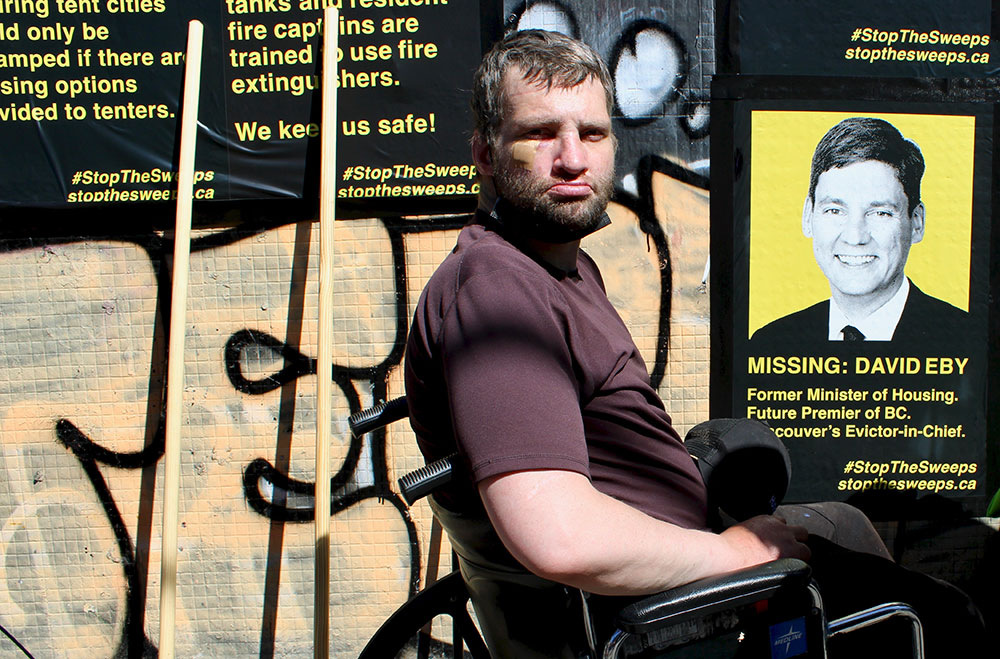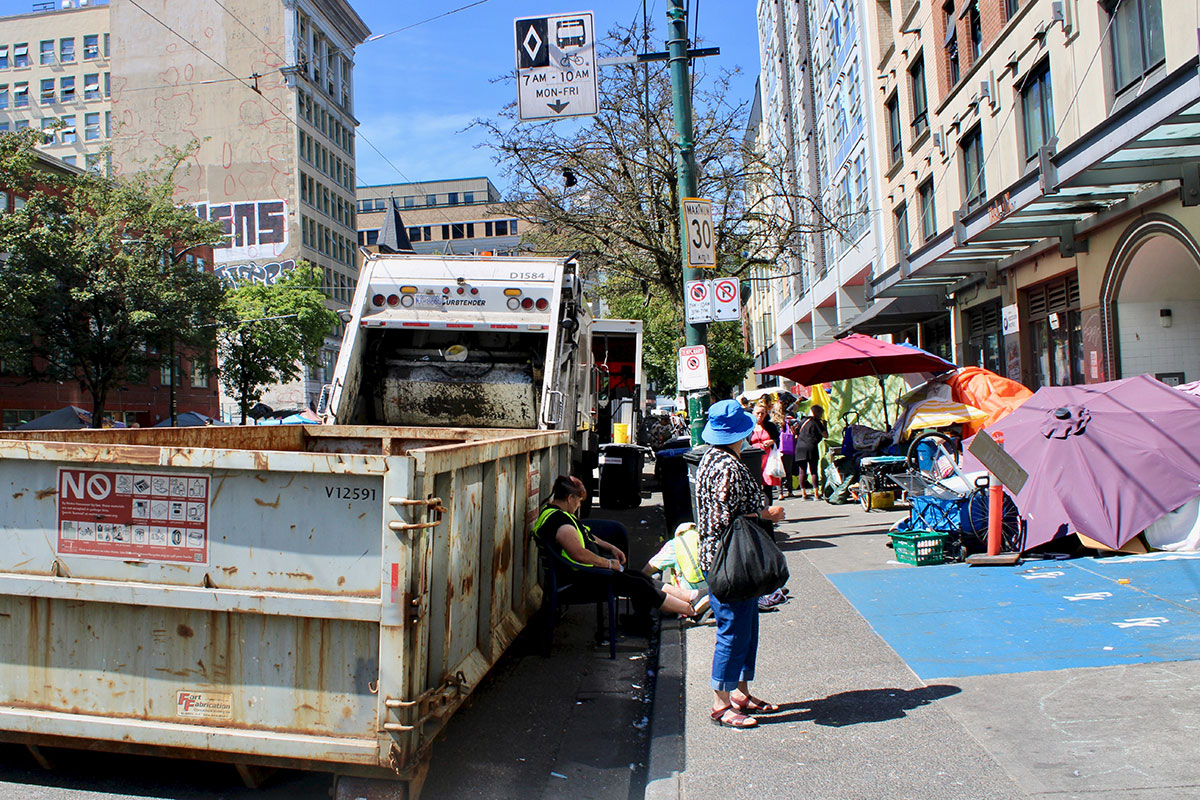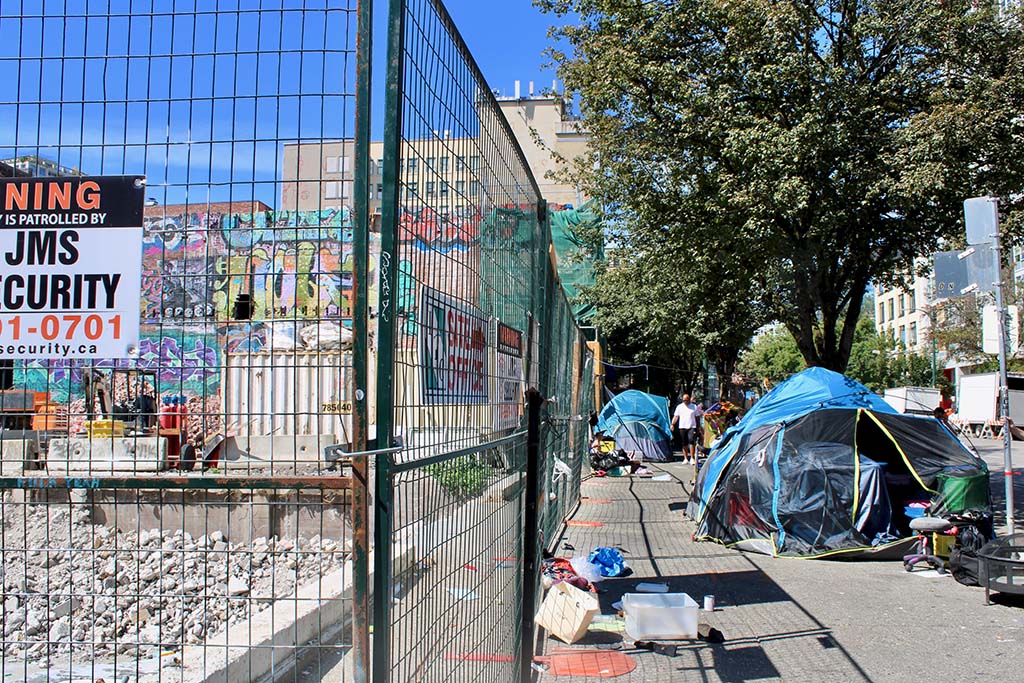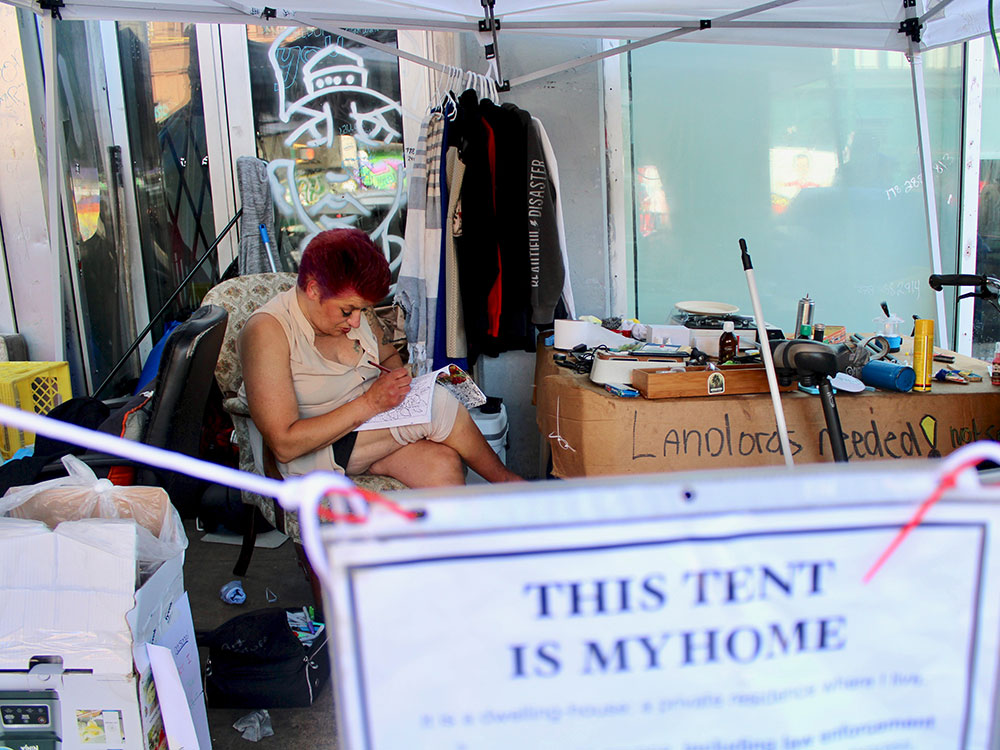Matthew Hall has been homeless for 15 years, but can’t find a wheelchair-accessible bathroom on East Hastings Street after he was banned from the Carnegie Centre, a community centre at Main and Hastings.
“Sometimes I have to wear a diaper,” he said. “We need more washrooms, more showers — we’re human too.”
Under a tent where a cardboard sign reads “Landlords needed — not SROs,” Kristy Wilson says she refuses to live in a single-room occupancy hotel, a type of housing often offered to homeless people in the Downtown Eastside. The 48-year-old says she lives with PTSD from past assaults and seeing friends beaten and killed.
“Those places are just disgusting,” Wilson told The Tyee, adding that her dog got violently ill after drinking the water in one of the SRO hotels. Violence is common in the hundred-year-old buildings, which are often in poor repair and infested with rodents and pests like bedbugs.
Maggie, 53, lives with her 78-year-old mother on East Hastings with their 17-year-old dog, Boo. Their tent has been taken multiple times by city workers.
After Vancouver’s fire department ordered unhoused people to remove tents and structures because of the risk of fire several weeks ago, city workers brought wheeled garbage bins for people to store their belongings in.
The bins appear to be clean and new, but Maggie said being given a garbage can to store her stuff is humiliating.
“We're treated just like those bins,” she said. “Garbage.”

Vancouver’s East Hastings Street tent city is not a new crisis. The situation has been developing at least since the start of the COVID-19 pandemic, when homelessness increased because of pandemic shelter closures.
But now in the heat of summer — a period when many people live on the street to escape their stifling SRO rooms — the tent city on East Hastings has exploded into a full-blown crisis that many community advocates say has been mismanaged by multiple levels of government.
At a press conference Tuesday, advocates called out Mayor Kennedy Stewart and David Eby, the former minister responsible for housing who is now running for premier, for their inaction.
“They knew it would be chaos at this time of year because everyone’s outside because of the heat — so they knew politically that it would look bad,” said Sarah Blyth, the executive director of the Overdose Prevention Society, who spoke to The Tyee on Monday on East Hastings Street.
“They didn’t want a plan. They wanted it to be a complete failure — so the media would come down and take photos.”
Homeless people have been ordered to clear their tents and structures — but the city and BC Housing have admitted there are few housing options to offer to people.
That’s a departure from previous efforts to clear large encampments, and it’s unclear where people are expected to move to.
Vancouver has dealt with many tent cities in the past, usually in city parks or vacant lots. Those encampments are usually allowed to continue for several months, often drawing complaints from nearby housed residents about crime, safety and being unable to use the park.
Over the years, the city and the province’s housing agency, BC Housing, have created a strategy of gathering together 100 to 200 shelter spots, SRO rooms or supportive housing apartments which city and BC Housing staff then offer to tent city residents. Sometimes the city or BC Housing leases or buys hotels or motels in advance of the effort to remove an encampment.
The strategy isn’t perfect: unhoused people can feel pressured to take housing that might not be right for them, and not everyone accepts housing. Eventually, the few remaining hold-outs are displaced as city workers gradually fence off more and more of the city park.
The city and BC Housing used this strategy to clear Oppenheimer Park in 2014, 2018 and again in 2020, and to remove another large encampment from Strathcona Park in 2021.

But when they tried the same tactics to move people out of CRAB Park in fall 2021, a Supreme Court decision put a halt to that effort. The judge in the case ruled that the shelter and SRO rooms being offered weren’t suitable to meet residents’ housing needs. Some of the spaces being offered weren’t actually available, according to the court decision.
The court ruling came after The Tyee had reported on serious safety and health issues for people living and working inside SROs being operated as supportive housing with funding from BC Housing.
While the city was busy dealing with tent cities in parks, the situation on Hastings Street drew little public attention. But every day, conflicts were happening on the street between unhoused people and the city workers and police who ordered people to remove their tents and other belongings. During the street sweeps, people often lost their tents, clothing and personal items like family photos and ashes of relatives or beloved pets.
After months of denial, the city finally apologized for the practice on June 22. In early July, Vancouver police announced they would stop accompanying city sanitation workers on the sweeps.
But by the end of July, the sidewalks on either side of East Hastings between Main and Columbia were full of tents, tables, furniture and other belongings. Throughout the spring, a series of fires had ripped through several SRO hotels and other buildings in the neighbourhood, and people feared an arsonist could be at work. On July 25, the Vancouver fire department ordered that tents and structures be removed because of the risk of fire.
BC Housing says it is now scrambling to renovate SRO rooms, lease new housing sites and find spaces that can be turned into homeless shelters.

“We were clear with the City of Vancouver and Vancouver Fire Rescue Services that, on short notice, we do not have access to large numbers of new spaces in Vancouver to accommodate the timing of the emergency order,” BC Housing communications staff wrote in an email to The Tyee in response to questions about the situation on East Hastings.
In an email, communication staff with the City of Vancouver said its outreach teams were working with people who are homeless on East Hastings, but referred all questions about whether any housing was being offered to BC Housing.
The neighbourhood has lost hundreds of SRO rooms over the past few years: the Balmoral and Regent still sit vacant after the city ordered them to close because of safety issues in 2017 and 2018, then started an expropriation process which ended in the city purchasing the two buildings in 2020. Tents are now pressed up against the front of the Regent.
The London Hotel closed this spring because it badly needed renovations. The Winters Hotel burned down in April, and the fire also left the Gastown Hotel empty because of smoke damage. Another fire at 566 Powell in July also led to the displacement of residents.
There is new social housing being built in the neighbourhood — but Blyth said that development has also put pressure on East Hastings Street because vacant lots and alleys where residents used to gather are now off-limits.
Blyth called for more public space to be created to relieve some of the pressure on East Hastings, where housed residents are getting into conflicts with unhoused residents. Advocates are also calling for more public bathrooms in the area.
The Overdose Prevention Society and the Vancouver Area Network of Drug Users are now working to try to keep the sidewalk clean, provide harm reduction in the midst of the overdose crisis and keep an eye on the actions of police and city workers. But Blyth said the city could have started working with the society, VANDU and other community groups before stopping the street sweeps and issuing the fire order.
“There’s no space,”said Blyth. “They squashed everyone into this space. They let it blow up, and then pitted people including the different communities against each other, gave them no space to go, and what did they think would happen?” ![]()
Read more: Rights + Justice, Housing, Municipal Politics
















Tyee Commenting Guidelines
Comments that violate guidelines risk being deleted, and violations may result in a temporary or permanent user ban. Maintain the spirit of good conversation to stay in the discussion.
*Please note The Tyee is not a forum for spreading misinformation about COVID-19, denying its existence or minimizing its risk to public health.
Do:
Do not: